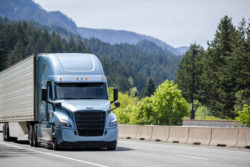
Truck accidents can have devastating consequences, leading to severe injuries, property damage, and even loss of life. Proving liability in these cases is crucial to ensure that victims receive the compensation they deserve. Like in many other states, establishing liability in a truck accident case in Florida involves a thorough investigation, adherence to specific legal principles, and understanding the unique challenges associated with these incidents.
Understand Florida Truck Accident Laws
Florida adheres to a no-fault insurance system, meaning that individuals involved in an accident must first seek compensation from their own insurance coverage, regardless of who is at fault. However, when injuries are severe or exceed the limits of the no-fault system, victims can pursue a claim against the at-fault party, including truck drivers, trucking companies, or other involved parties.
Gather Evidence at the Scene
Proving liability starts at the accident scene. Gathering crucial evidence as soon as possible is essential for building a solid case. Begin by contacting law enforcement to report the accident and ensure a thorough investigation takes place. Take pictures of the scene, including vehicle positions, damage, skid marks, and any relevant road conditions. Obtain contact information from witnesses and record their statements.
Consider the Truck Driver’s Conduct and Training
Looking at the truck driver’s conduct and training is crucial in determining liability. Obtain the driver’s employment history, driving record, and any records of previous accidents. Verify that the driver possessed the necessary qualifications and adhered to federal regulations governing hours of service, rest breaks, and other safety guidelines.
Review Vehicle Inspection and Maintenance Records
Truck accidents can often be attributed to mechanical failures or poor maintenance. Request the inspection and maintenance records for the involved truck. Check for any history of neglected repairs, faulty equipment, or non-compliance with safety standards. This information can be pivotal in establishing liability against the trucking company.
Employer Liability for Trucking Companies
In many cases, the trucking company may share liability for the accident. Assess the company’s hiring practices, training programs, and overall commitment to safety. If the trucking company failed to conduct adequate background checks, provided insufficient training, or neglected necessary maintenance, they may be held accountable for their negligence.
Electronic Logging Devices (ELDs) and Data Analysis
Modern trucks have electronic logging devices (ELDs) that record crucial data, such as driving hours and vehicle speed. Obtain and analyze this data to determine if the driver adhered to the mandated regulations. Discrepancies or violations may indicate negligence by the driver or the trucking company.
Witness Testimonies and Expert Opinions
Collecting witness testimonies and seeking expert opinions can further strengthen the case. Witnesses who observed the accident can provide valuable perspectives, while experts in accident reconstruction, trucking regulations, or medical fields can offer professional assessments that support your claim.
Surveillance Footage and Black Box Data
Many trucks have event data recorders, commonly called “black boxes.” These devices capture crucial information, including speed, braking, and acceleration data leading up to the accident. Additionally, check for nearby surveillance cameras that may have recorded the incident.
Medical Records and Expert Testimonies
Proving liability also requires establishing a clear link between the accident and the injuries sustained. Obtain comprehensive medical records detailing the extent of injuries, treatment received, and long-term prognosis. Expert medical testimonies can help connect the injuries to the accident, demonstrating the direct impact of the truck collision.
Seek Guidance From a Skilled Truck Accident Attorney Today
Successfully proving liability in a Florida truck accident case requires a thorough and strategic approach. By gathering extensive evidence, assessing the conduct of the truck driver and trucking company, and leveraging expert opinions, victims can build a strong case to pursue the just compensation they deserve. Getting a good grasp of Florida’s unique legal landscape and navigating its complexities empowers injured individuals to seek justice and hold responsible parties accountable for their actions. Our firm is here to help you do just that — contact our office today for immediate assistance.
The post A Guide to Proving Liability in Florida Truck Accident Cases appeared first on Searcy Law.




